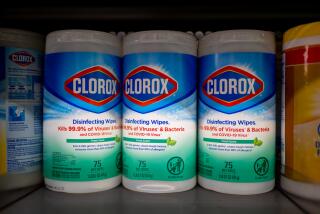Chiron Posts Loss on Flu Shot Woes
- Share via
The suspension of Chiron Corp.’s flu vaccine sales in October clobbered the company in the fourth quarter, causing a loss that drove its shares lower Wednesday.
Chiron reported a loss of $22.9 million, or 12 cents a share, contrasted with a profit of $121.8 million, or 61 cents, a year earlier. Revenue fell 23% to $428.6 million from $554.6 million.
Excluding special items, the loss would have been 4 cents. Analysts surveyed by Thomson First Call had expected that number to be 10 cents.
Chiron shares skidded $1.84 in after-hours trading. In the regular session on Nasdaq, they closed at $33.94, up 20 cents.
The Emeryville, Calf., company sold no Fluvirin vaccine in 2004 because British regulators suspended operations at the company’s factory in Liverpool in October. Expenses related to the vaccine mess totaled $15 million in the quarter, including $11 million in legal costs. And the company warned that such expenses would continue.
Analyst Eric Schmidt of SG Cowen & Co. said Chiron’s performance was far worse than he had anticipated. In addition to suffering flu vaccine woes, the company is spending too much on unproductive drug research programs, he said. Unlike biotechnology rivals Amgen Inc. and Genentech Inc., Chiron has no blockbuster drugs.
“Expenses are spiraling out of control. I wish they would just shut down [research and development]; the company would be worth more,” he said. “Some investors are growing impatient.”
Chief Executive Howard Pien said during a conference call with investors that the company made “great strides” in drug development and that he expected Food and Drug Administration approval of a medicine for lung transplant patients in the third quarter.
But Pien said little to resolve the uncertainty surrounding Chiron’s Liverpool plant and offered no assurance that it would reopen soon. The factory was to have shipped 52 million flu shots last year, half the anticipated U.S. supply.
Pien said the company was working diligently to correct the numerous problems found by government inspectors from Britain’s Medicines and Healthcare Products Regulatory Agency and the U.S. Food and Drug Administration. The two agencies cited Chiron for sloppy manufacturing practices and evidence of bacterial contamination in crucial parts of the Liverpool plant.
Chiron has said that it must begin vaccine production by early spring to provide flu shots for the 2005 season, and analysts are divided on whether Chiron can meet the deadline.
“The next two months will be pivotal,” Pien said.
The company is several months behind its rival, Sanofi Pasteur, formerly known as Aventis Pasteur. In December, the French company started growing one of three influenza strains that it believed would be needed for the vaccine, a spokesman said Wednesday.
The exact strains won’t be known until Feb. 16, when an FDA advisory committee is scheduled to select them. The strains that make up the virus change slightly from year to year as new forms of flu virus emerge. Once the three strains have been identified, full-scale production can begin -- a process that takes four to five months.
“This is just speculation, but I think it is pretty tenuous that Chiron can get vaccine ready for next year,” said Greg Poland, head of the Mayo Clinic’s vaccine research group.
Chiron faces a federal investigation, an inquiry by the Securities and Exchange Commission and a slew of shareholder lawsuits stemming from the shutdown of the Liverpool plant.
Chiron also reported full-year results Wednesday. For 2004, the company earned $84.9 million, or 45 cents a share, down from $227.3 million, or $1.19, in 2003.
Revenue fell 2% to $1.73 billion from $1.77 billion in 2003. Analysts had expected Fluvirin sales of about $300 million for 2004.
More to Read
Inside the business of entertainment
The Wide Shot brings you news, analysis and insights on everything from streaming wars to production — and what it all means for the future.
You may occasionally receive promotional content from the Los Angeles Times.










